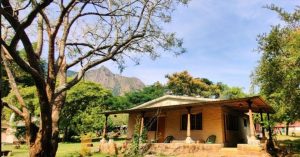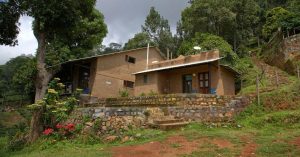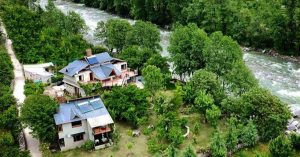21 Countries, Unlimited Lessons: I Let Go Of Guilt When Travelling With My Son Who Has a Rare Disease
Moushmi Kapadia is an avid biker, trekker and a mom of two. Her older son Vedansh has Rigid Spine Muscular Dystrophy (RSMD) but has beaten all odds to travel the globe with his mom. This is her story of finding herself in motherhood and discovering the joy of travel.
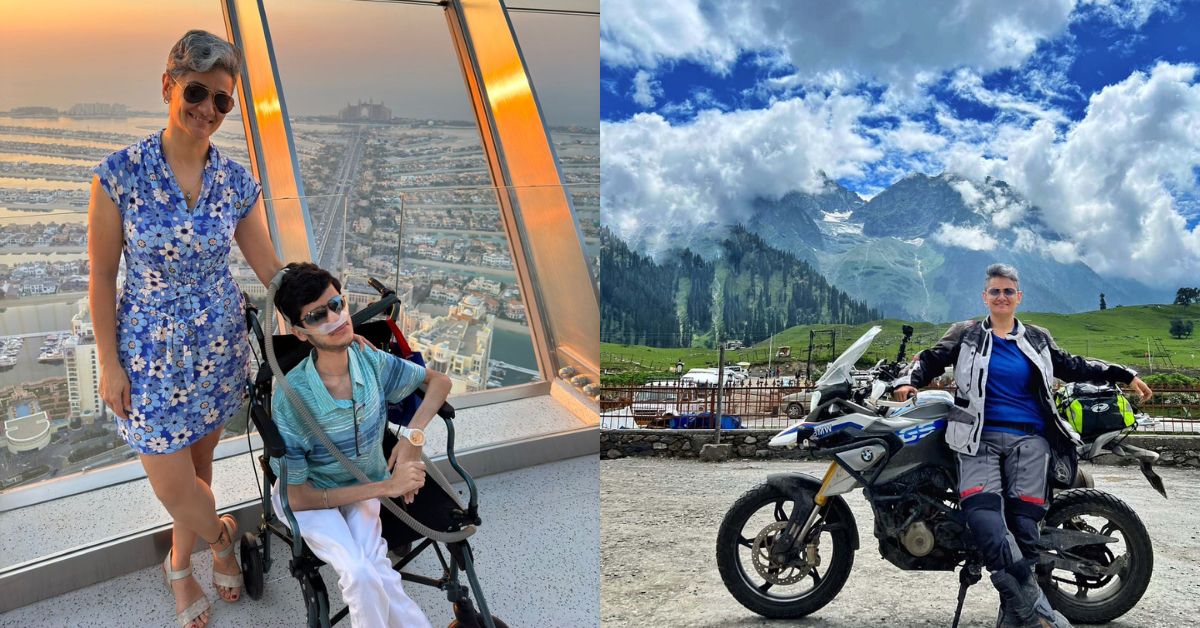
(TW: Mentions of struggles with disability, depression and other mental health struggles.)
“I knew something was wrong with me when I handled my baby roughly,” Moushmi Kapadia shares.
The incident, which took place in 2009, woke Moushmi up to take control of her life. Battling depression for three years, she decided to become the best version of herself for her two young children.
Handling two kids, one a five-year-old with a rare disease, and the other just a baby, all alone in Mumbai, took a heavy toll on Moushmi’s mental and physical health. As she scrambled around trying to handle her firstborn’s hospital visits and looking after her infant’s needs, the young mom lost herself in the process.
She was frustrated, sad and angry all the time. Having neglected herself for over six years, she slipped into depression over time. She remembers being overwhelmed by the situation. Her husband was in Dubai for work while she returned to Mumbai for her son’s treatment.
“I wanted to give my children the best mom in the world. I didn’t realise at that time that there was no such thing as a best mom. You only need to be a happy mom,” she adds.
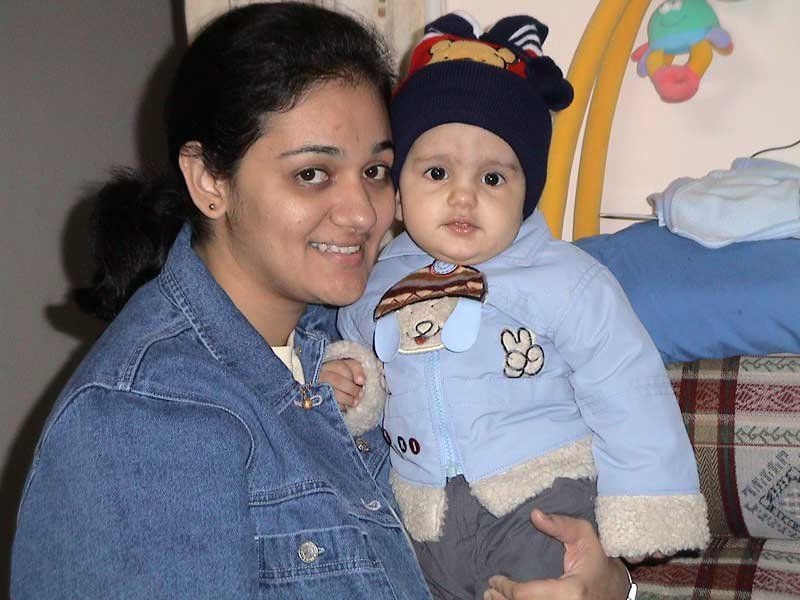
Since that fateful day almost 15 years ago, there has been no looking back. Starting with counselling, she started her fitness journey and did everything she ever wanted to do. From biking across the country to scaling the highest peaks, this 45-year-old has done it all. She has explored 21 countries and 26 states, been on 15 biking expeditions across the country and 12 treks.
Her first born Vedansh, who has a rare genetic disease called the Rigid Spine Muscular Dystrophy (RSMD) which causes muscle degeneration, is also a beacon of inspiration with his never-say-die attitude and is living a life with no regrets.
Here’s the story of how Moushmi turned her life around-
‘Doctors told me my son had four years to live’
When Vedansh was one, Moushmi and her husband, Priyesh, started noticing that he wasn’t able to hold his neck. The next 18 months that followed were some of the most difficult times in the couple’s life. Their baby kept falling sick and yet, they weren’t able to get a proper diagnosis.
“They conducted a plethora of tests at the time. Everything returned normal, yet there was something wrong with my child. He started having pneumonia attacks and had to be hospitalised. They would insert an electronic needle in his neck to check if it was normal,” Moushmi shares with The Better India.
After consultations from doctors across different hospitals, a doctor in the UK was finally able to unveil the root of the problem. Vedansh was diagnosed with RSMD, a genetic disorder which causes muscle weakness, especially of the neck and torso, and causes breathing difficulties. In Vedansh’s case, it also led to scoliosis (a sideways curve of the spine), which required surgery.
Moushmi’s first reaction when she heard the diagnosis was one of relief.
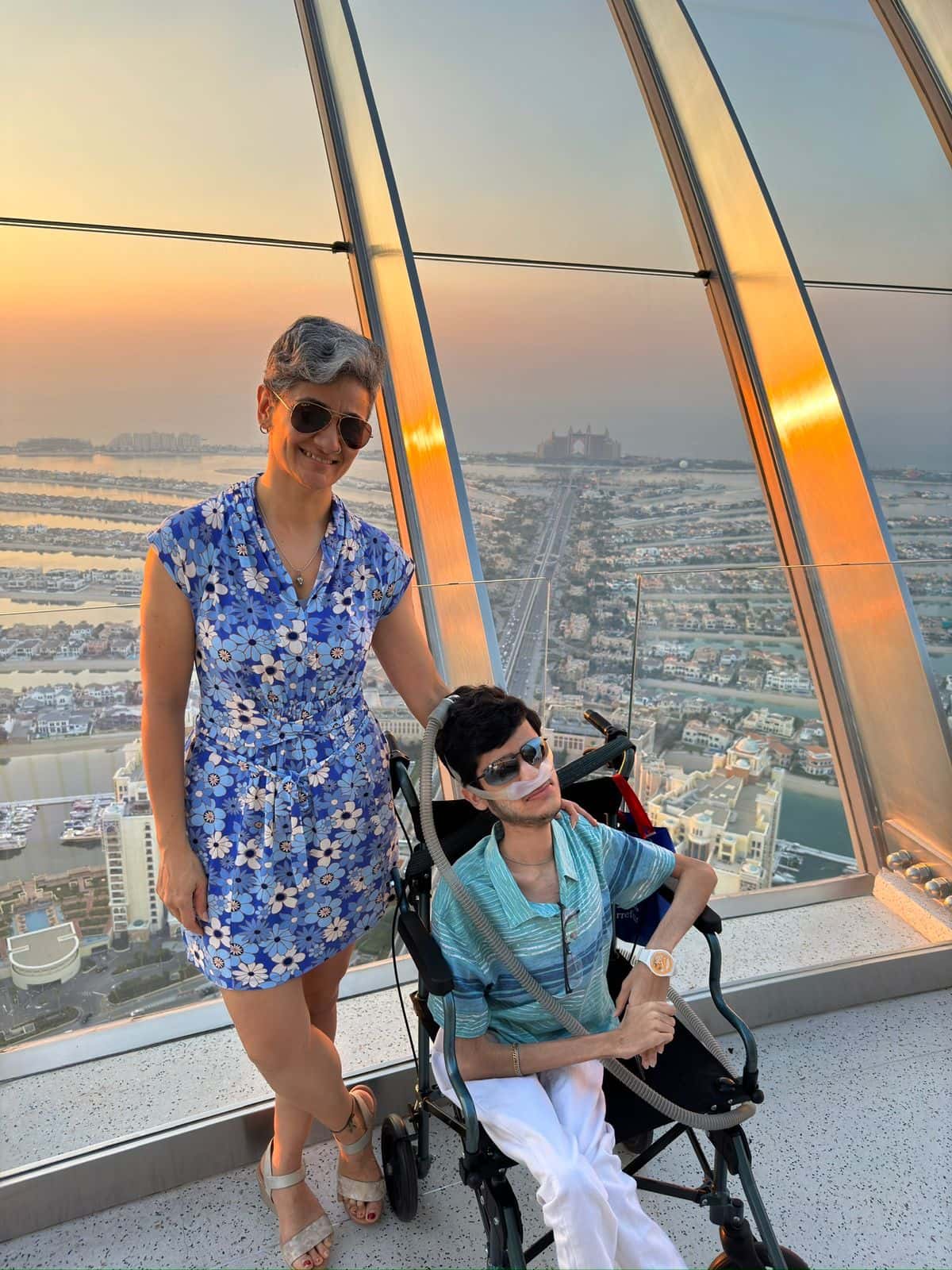
“I finally knew what the problem was. But the next minute, the doctor said that nothing could be done about it. It is an incurable disease and we can only maintain the child. That was devastating,” recalls Moushmi.
Armed with this new information, they returned to Dubai. The doctor in the UK had explained the dos and don’ts, how to take care of the child, and what could happen. As they settled into a routine, Vedansh had a massive pneumonia attack when he was three. Recalling that day, Moushmi remembers how she collapsed on the floor as she watched her toddler in the ICU.
“They didn’t tell me that they would put him on the ventilator. All I could see in the ICU was a pillow and my child on it. The pillow was bigger than him. Doctors had lost hope and told me, ‘Pray to God, we’ve tried our best’. It was all too much for me to take and I just collapsed,” she says.
As he remained on the ventilator for five days, an Indian doctor in the hospital advised the young couple to take the child to India for treatment. Moushmi shudders as she recalls the day they took their child off the ventilator to board the flight back home.
“The doctor there said that we wouldn’t be able to wean him off the ventilator if we stayed there. Medical facilities weren’t that good in Dubai 20 years back. A particular machine, which was required to help him breathe, wasn’t available. As soon as we arrived in Mumbai, we had three people ready with the instrument,” she adds.
After a few days in the hospital, Vedansh was better, but the doctors told Moushmi that he would live for only 4-5 years. As medical treatment was better back home, she decided to stay back while Priyesh returned to Dubai for work.
The next few years were spent in hospitals as the 3-year-old had multiple pneumonia attacks caused by weak lungs. Even today, Vedansh uses a BiPap machine to help him breathe.
A few years later, the couple welcomed a second child, which made life for Moushmi even more difficult as she had to hold the fort alone for a while.
“I was angry all the time. I would slam doors and was irritated. I didn’t realise that I was depressed. I had stopped thinking about myself. Looking at my state, my friend suggested that I start counselling,” she adds.
Moushmi’s journey in therapy lasted for three years. However, the medications took a toll on her and she gained weight. The weight gain during her second childbirth had also impacted her knees and left them damaged. Her psychologist suggested that she start some physical activity.
A game of tennis that started it all
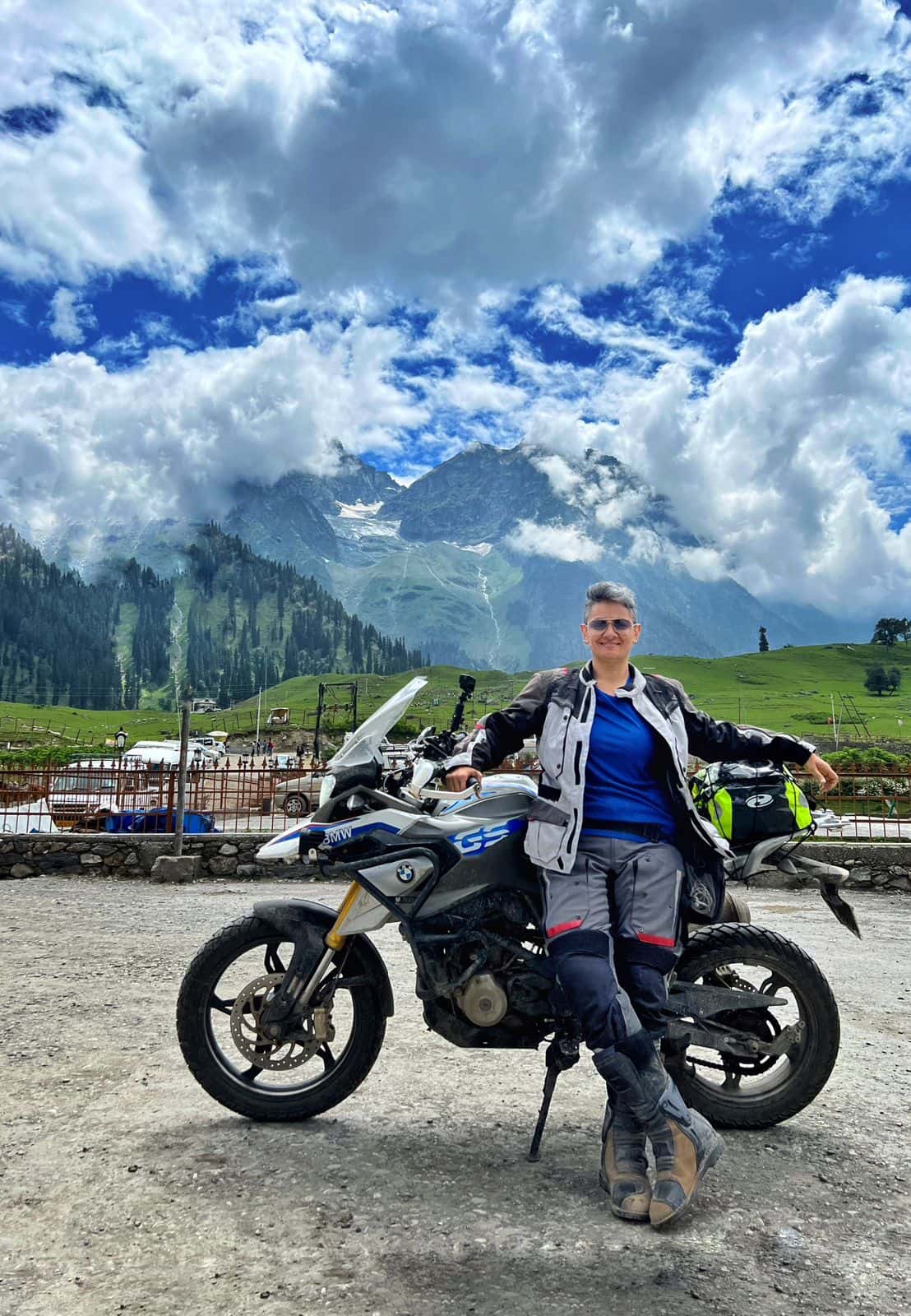
Realising that this was not how she wanted her health to be at 35, she started playing tennis, a sport she loved. In the first few days itself, she saw her mood changing and began feeling better.
She then joined zumba classes and as she felt more confident, she enrolled in a gym.
“Working out releases endorphins, a happy hormone that makes you feel great. I felt more present at home after doing something for myself and I slowly started understanding fitness and got deeper into it. It’s not just about losing weight, but it’s about building muscles and improving your overall health,” explains Moushmi.
As she became happy and content, her children modelled her behaviour. Soon, Moushmi started following her passions, which included biking and trekking. She bought a bike for herself in 2013 and started going on long solo rides. She also started her own venture, an event decor company, and worked as a professional photographer.
“Biking gives me a sense of freedom. It feels meditative and makes me feel independent. Travelling gives me a different perspective on life. I also started challenging my limitations by trekking. Every trek feels like an attempt to conquer our physical and mental obstacles,” she adds.
Moushmi had support from her in-laws as she embarked on these trips. Her children, too, learnt to be independent. Vedansh also started attending school.
“This helped me give my kids direction and motivate them. Both my kids are not dependent on me now. Vedansh takes care of himself with his limitations and capabilities,” she adds.
After a few one night biking trips, Moushmi decided that it was time to go on her dream ride to Ladakh. Initially, she admits to being scared as she was a new rider and this would be her first long distance trip. But having crossed the age of 35 at that time, she decided that it was now or never.
“I did have a worry at the back of my mind about what would happen if something were to happen to me. What would happen if the decision I took was the wrong one? People cautioned me against it, saying what if something happens to you on the trip? But I had decided that the trip was mandatory,” she adds.
She adds that her sons were very supportive of her decision and the reason she could take this decision was the fact that they could manage themselves.
On her first long biking trip, she went to Leh Ladakh for 10 days. She recounts that it was a challenge, but both mother and son learnt to manage without one other over time.
“At first, a shiver would run down my spine whenever I got a call from home. I would worry if Vedansh was doing okay. It was difficult for both of us. But after overcoming the initial hiccups, he adjusted very well,” she adds.
Being away from each other for such a long time was a first for both mother and son. It’s not all hunky dory, adds the mother. There were teething troubles initially, but they both got used to it over time, and when Moushmi came back with a certificate for completing the trip, Vedansh was very happy and proud of his ‘mumma’.
In fact, Vedansh got the travel bug from his mother. He, too, has explored many countries and celebrated his 19th birthday at Jungfrau, one of the highest points in Europe.
As Moushmi spread her wings, she became a ‘calmer, better’ mom and got closer to her children. She connected more with Vedansh and their conversations became more meaningful.
To every mother grappling with the decision of whether they should leave their children and go on a trip, she says that first and foremost, mothers should let go of their ‘mother’s guilt’.
“We create this guilt and it’s all in our mind. We think that our children feel sad when we leave them and go. Do they really feel so though? We put these thoughts in their mind. We wonder who will take care of the child. Firstly, tell yourself it’s okay and know that your child will be taken care of. He or she is in good hands,” she adds.
Vedansh, who is a few months short of 20 today, runs their family’s ice-cream parlour in Mumbai. According to his mother, he has great willpower and runs an Instagram account, ‘motivation.vedansh’, to inspire others through his life’s journey.
A clear glimpse of his resilience was witnessed in 2016, when he had to undergo a life-threatening spine surgery. As the doctors wheeled him in for surgery, Vedansh insisted that his mother stay by his side.
The surgery took 8.5 hours, and the then 12-year-old, was on a ventilator for a week. The moment he woke up after five days was the best in Moushmi’s life.
“I had promised my mumma that I would come off the ventilator, hale and hearty. And so I did,” says Vedansh.
Within 40 days, he was back at school and amazed everyone with his will power. Seeing her child flourish and cope with every challenge that came his way gave Moushmi the motivation to do more.
“When my child is not complaining, why should I? He is never frustrated and doesn’t throw any tantrums. He got to terms with his disease and accepted it,” says Moushmi.
‘This Part of My Life Is Called Happiness’
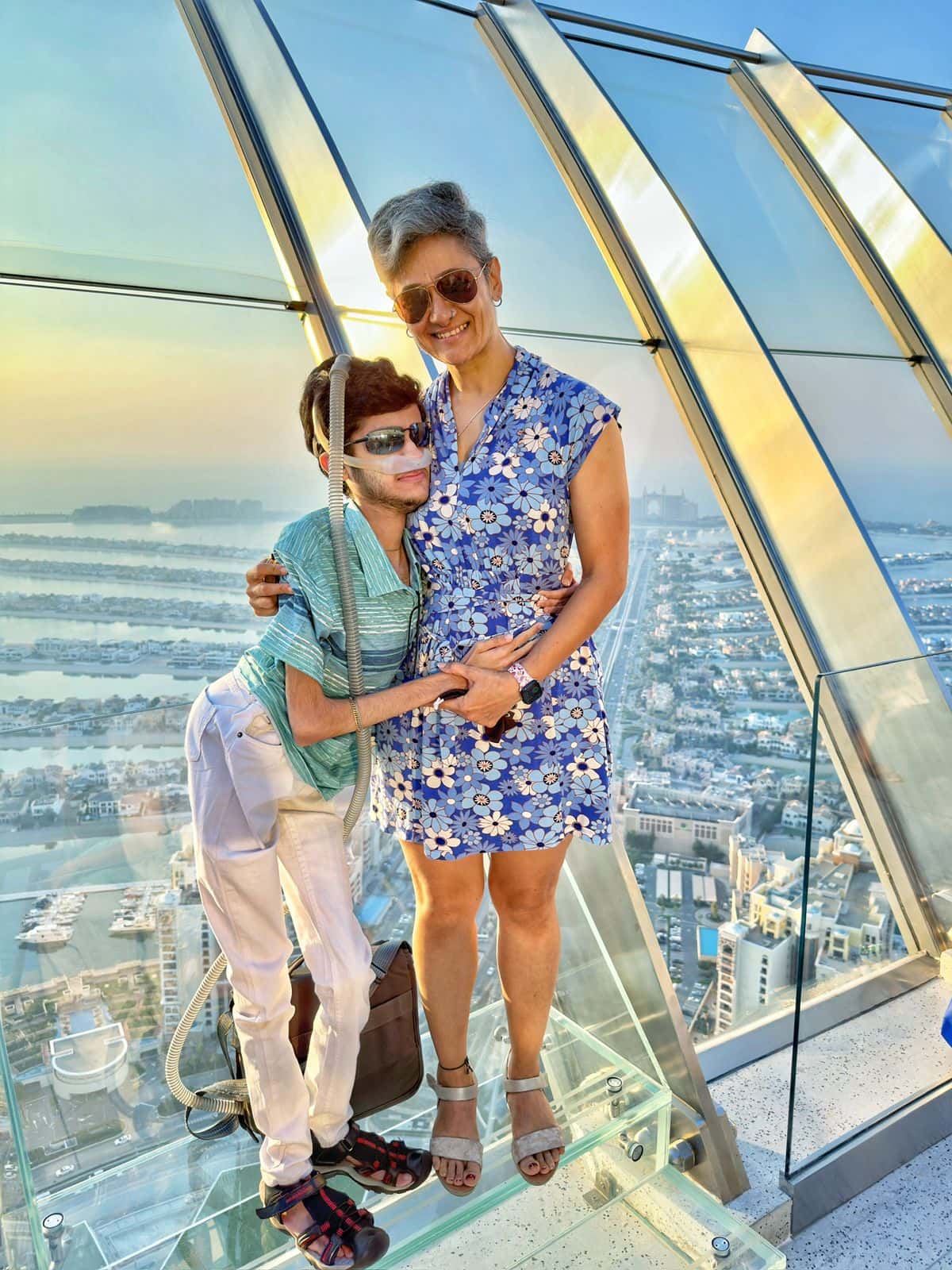
Ask Vedansh what bothers him, and displaying maturity beyond his age, he says that he’s happy about everything and sad about nothing.
“Life gives you challenges but it’s how you face them that decides your life ahead. Never give up. I take it one day at a time and try to see something positive in each moment,” he adds.
For a school essay, where he was asked to write his likes and dislikes, under dislikes he wrote that he has a disease and can’t run, while adding, “I’m still very happy.”
For Moushmi, these are the five takeaways from her life –
- Women don’t need to sacrifice themselves.
“We are always told that we need to compromise, sacrifice and adjust. We are told that it’s selfish if you love yourself. But only when I love myself can I love my children,” she says.
- If you want to, you can.
“Everyone tells me that they can’t do what they want because of their children or lack of familial support. If I can, with a child with needs, a baby with their father in another country, you can too. You only need the motivation to do it,” says Moushmi.
- Take care of your mind and body.
“Everything else is secondary. Every other role comes after that. We usually put ourselves last. It should be the other way around,” says Moushmi.
- Life is all about finding balance.
“There is no right or wrong. If it makes you happy, it’s right for you. Find your balance in what you eat, do and say,” she adds.
- Live your passion.
“Once I started doing the things I loved, I became better at every sphere of life. Only when you make yourself happy can you make the others around you happy,” she adds.
Both mother and son have proven through their actions that major, unforeseen hurdles can be overcome. While Vedansh needs a machine to breathe 20 hours a day and a wheelchair most of the time, he is following his dreams and living a life of no regret.
So, what’s stopping you from living a full life?
Edited by Padmashree Pande
If you found our stories insightful, informative, or even just enjoyable, we invite you to consider making a voluntary payment to support the work we do at The Better India. Your contribution helps us continue producing quality content that educates, inspires, and drives positive change.
Choose one of the payment options below for your contribution-
By paying for the stories you value, you directly contribute to sustaining our efforts focused on making a difference in the world. Together, let's ensure that impactful stories continue to be told and shared, enriching lives and communities alike.
Thank you for your support. Here are some frequently asked questions you might find helpful to know why you are contributing?







